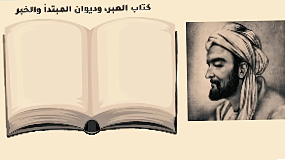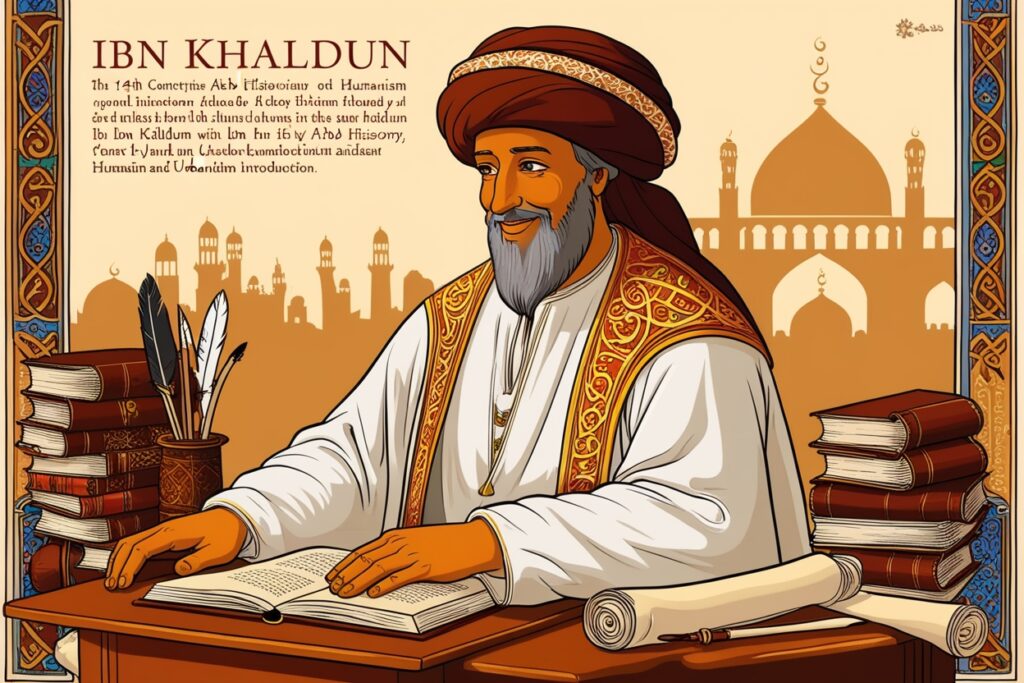The book which is recommended by figures such as Mark Zuckerberg, This article aims to provide a comprehensive summary of his works. Summary of Ibn Khaldun’s Introduction.
Who is ibn khaldun :
In allusion to his grandfather Khalid, Abd al-Rahman ibn Khalid, also known as Abd al-Rahman ibn Khaldun, gained notoriety as Ibn Khaldun. He was known as Ibn Khaldun because the inhabitants of Andalusia and Morocco always added the letters u and n to the end of names to show respect. He was born in 732 AH, and the Tunisians are still aware of the home where he was born. Through the seven readings, he became proficient in the Quran. He then studied Islamic jurisprudence and sciences in accordance with the Maliki school of thinking. He then studied the disciplines of language, such as literature, morphology, grammar, and rhetoric.He then pursued studies in philosophy, logic, and the natural sciences.
In addition to the several sheikhs (teachers) who have taken care of him when he was a small child, his father was the first teacher he ever had. Throughout his life, Ibn Khaldun held significant political positions in a number of nations, including Egypt, Andalusia, and the Maghreb. He was not merely a traveler. He became quite close to the governing class as a result of this, in addition to interacting with the general populace. Ibn Khaldun’s most significant influence It is the Book of Lessons, his great historical work. This work was divided by Ibn Khaldun into three volumes, an introduction, and sermons.

What we are discussing in this article is what we now refer to as Ibn Khaldun’s Introduction, which includes the introduction and the first book. Ibn Khaldun’s Introduction continues to have an impact on our lives now. It is reflected and incorporated in the field of sociology, which Ibn Khaldun refers to as the circumstances of human society.
The thought that there are laws governing the social phenomena around us and that these laws are usually repeated extremely frequently is what led Ibn Khaldun to start this study. He saw something that everyone else had missed. For this reason, Ibn Khaldun intended to compile all of this discussion into a book that would serve as a guide for those who followed him and for others who wish to write or study history.
Humain and Urbanisme :
The concept of urbanization is among the most significant concepts that Ibn Khaldun was concerned in. Ibn Khaldun believed that urbanization was the full expression of civilization. You have a fully developed civilization that is highly urbanized. It’s the greatest level you can get. The final concept of urbanization is the whole picture, which includes the integration of politics and economics, the expansion of factories, the development of sciences, and national stability. The concept of urbanization achieves the pinnacle of civilization when all these factors are present in a nation and the nation is successful in controlling them. Understanding the individual human being is necessary before we can advance to the state, civilization, and urbanization stages. According to Ibn Khaldun, people are social creatures by nature, and it is through socialization that they are able to meet their basic needs. He doesn’t look for anything opulent. He aspires to lead a very basic, archaic life.He desires a very basic, archaic lifestyle.
There is no luxury or extravagance of any kind in this existence. As a result, Ibn Khaldun believes that any society originated with the Bedouins. If you look at any of the tribes that lived in the deserts of Egypt, the Maghreb, or the Gulf countries around fifty to sixty years ago, you will see that they led extremely simple lives with few necessities.Nomadism, in my opinion, is the cornerstone of civilization. Following the completion of the first stage, known as the nomadic stage, individuals start to enjoy a certain level of luxury and prosperity.
They go into the second stage, known as the urban stage, when their circumstances improve. At this point, a person wants to live in luxury, dress to impress, purchase gold, plan for big cities, and construct enormous structures. As a result, a person starts to evolve and his life priorities start to diverge significantly. According to Ibn Khaldun, Bedouins are more moral than city people. City inhabitants’ lives are regarded as being very simple because they are filled with joys and cravings and all the party manifestations that might negatively impact their mind. According to Ibn Khaldun, Bedouins are more courageous than city people. In contrast to those who live in cities and rely on the army and the ruler to protect them, people in strong relationships—some of which can even become kinship relationships—have an internal motivation to defend one another. At the same time, authority in civilized societies always has a tendency to oppress and frighten people, which weakens the souls of those under its control.
The Bedouin tribes’ belief in bravery is what enables them to approach the king, and the concept of kingship itself is the notion that you gain control of a location by force; according to Ibn Khaldun, kingship is distinct from leadership. According to him, kingship always entails the use of force, but leadership is achieved by followers who are free from oppression, fear, or violence. According to Ibn Khaldun, urbanism embodies civilization in its entirety. With urbanism, you have a fully developed civilization that is at the forefront of urbanization. It represents the pinnacle of the most significant concepts in which Ibn Khaldun was engaged.
The final concept of civilization is the overall picture that combines economics and politics, the expansion of industry and science, and national stability. Before we reach the stage of the state, civilization, and urbanisme, the concept of civilization reaches its highest degree when all of these components come together in a nation and the nation is successful in controlling them. We need to comprehend the individual.
According to Ibn Khaldun, people are social creatures by nature, and it is society that enables them to meet their wants. He wants to live a very basic, archaic existence, which is why he looks for anything opulent. There are no individuals of any kind in this life who can enter the kingdom. Ibn Khaldun asserts that kingship is distinct from leadership and that the concept of kingship itself is the notion that one acquires the authority of a certain location by might. According to him, kingship always entails the use of force, but leadership is achieved by followers who are free from fear, violence, or coercion.

